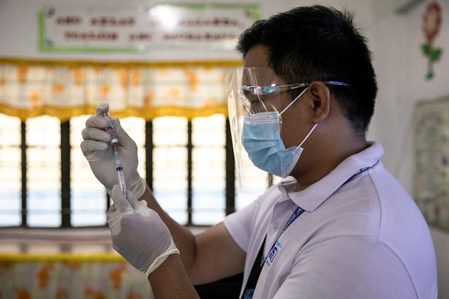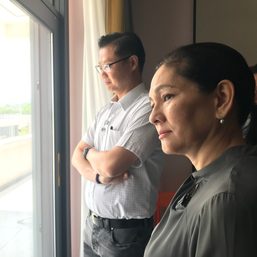SUMMARY
This is AI generated summarization, which may have errors. For context, always refer to the full article.

Congress passed the COVID-19 vaccine bill on final reading on Tuesday, February 23, as the House of Representatives adopted the Senate version of the measure.
The Senate on Tuesday passed on 2nd and 3rd reading Senate Bill (SB) No. 2057, which proposed the much needed indemnification fund and clause required for COVID-19 vaccines to arrive in the Philippines.
The bill proposes that a P500-million COVID-19 National Vaccine Indemnity Fund be created, which would be administered by the Philippine Health Insurance Corporation (PhilHealth). It would be sourced from the Contingent Fund under the P4.5-trillion 2021 national budget.
After amendments, the bill now proposes that the fund be valid until the President terminates the need for the fund.
The immunity from liability provision also now includes “representatives of private entities,” along with public officials and employees, contractors, and volunteers. The immunity does not cover complaints arising from misconduct and gross negligence.
In the earlier version, the Secretary of Health was given the power to create guidelines and designate persons who would be immune from suit. This was deleted from the approved version.
Carrying the proposal of the Department of Health (DOH), SB 2057 also proposed that licensed pharmacists and midwifes trained by the department would be allowed to administer vaccines that were given emergency use authorization by the government.
The bill also proposed the creation of a joint congressional oversight committee and that a report on the implementation of the vaccine program must be submitted by the government to Congress.
The lower chamber on Monday, February 22, passed HB 8648 on final reading. There were still minor differences between the two versions, and a source had said that the House was open to adopt the Senate version so that there won’t be a need for a bicameral conference committee.
At past 9:35 pm Tuesday, House lawmakers agreed to adopt the Senate version of the measure. The measure, which was certified as urgent by Malacañang, is now up for President Rodrigo Duterte’s signature.
Issue on indemnity fund
Senate President Pro-Tempore Ralph Recto on Monday suggested a major change to the indemnity fund provision, which assigned both PhilHealth and the DOH to be on top of the fund.
Recto said that medical costs due to severe effects arising from immunization should be paid by the PhilHealth. Other compensation, in case of death or injury, should be determined by the DOH. The senator also said that the amount of the fund should be “P500 million or more” when the need arises.
Recto said that assigning the task to DOH was like how it was under the Bayanihan Act, when the department provided compensation to the families of health workers who died from COVID-19.
The proposed amendment, however, was not carried. Citing advice from the Department of Finance, Senator Sonny Angara, the sponsor of the bill, said on Monday that it was “preferable” for one agency to administer the fund.
On Tuesday, Recto agreed with the amendment that only PhilHealth would administer the funds and that the state health insurer would be on top of providing compensation to vaccine recipients in case of death or permanent disability.
Vaccine ‘cards’ not passport
The proposed vaccine “passport” was also changed to a mere “card,” following Senator Koko Pimentel’s comment that Filipinos who do not want to be vaccinated may find it discriminatory.
Pimentel earlier raised that the word passport connoted mobility and such program might affect this. He said that the danger could be that majority of establishments might possibly require individuals to show their passports first before allowed entry, and therefore, discriminate those who did not want or have yet to be vaccinated.
Under the approved version of SB 2057, the vaccine cards issued by local governments should not be a mandatory requirement for education, employment, and other similar government transactions.
The proposed vaccine card was intended to be in the digital form to avoid costs related to printing. SB 2057 proposes that the DOH keep a central database for all COVID-19 vaccinations.
The violations and penalties related to vaccine card program was also removed from SB 2057, as these were already in the Revised Penal Code. While Angara said that the minimum imprisonment for these violations was heavier under the RPC at 6 years instead of the proposed 3 years, he accepted this amendment. – with a report from Mara Cepeda/Rappler.com
Add a comment
How does this make you feel?






There are no comments yet. Add your comment to start the conversation.